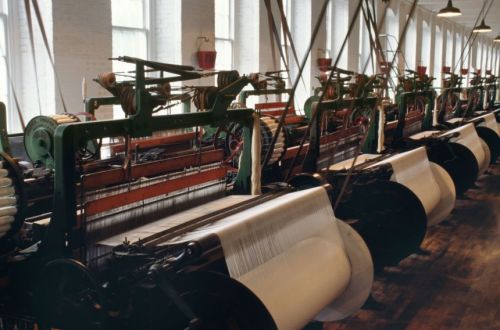America
-
Give Me Your John Hancock
The name John Hancock is synonymous with one’s signature. He was the first person to sign the Declaration of Independence and legend has it that he purposely made his signature large and legible, so that King George III would be sure to read it clearly. Born on January 23, 1737 in Braintree (now Quincy), Province of Massachusetts Bay he was one of the wealthiest men in the Thirteen Colonies; thanks to an inheritance from his successful mercantile uncle. Before his death on October 8, 1793, he was the 1st and 3rd Governor of Massachusetts.
-
Founding Father Samuel Adams
One of the signers of The Declaration of Independence and an organizer of the Boston Tea Party, it is clear that Samuel Adams was a staunch opponent of Great Britain. He was born in Boston, Massachusetts on September 27, 1722 and President John Adams was his second cousin. He was a graduate of Harvard and went on to become a U.S. Governor, Statesman before his death on October 2, 1803.
-
Paul Revere Rides
On April 18, 1775, it was Dr. Joseph Warren who instructed Paul Revere to alert Adams and Hancock that the British Army was on the way to arrest them. On a borrowed horse Revere set out as messenger on his famous ride from Charlestown to Lexington.
-
History Today: The Alamo
Texas was once a Mexican state, when a push for independence from within became strong; a desire to be free from the rule of the Mexican government. Colonel William Travis was seen as a vital leader of this uprising. The Texas revolution began in 1835 and in February of 1836 Travis was appointed as a lieutenant colonel of the San Antonio troops. It was on February 23, that a surprise arrival of the Mexican army under General Santa Ana sent the Texas troops retreating into the old Spanish mission, the Alamo. It was there that they sought refuge from the 5,000 soldiers of the Mexican army. The Alamo defenders were 186 small. Knowing they were seriously outnumbered, Travis…
-
History of Skid Row
The term “Skid Row” derives from Seattle. Washington, where “skid roads” were the places that loggers slid their cut timber to the ports for shipment. By the 1930’s the term referred to the rundown areas of cities, characterized by bars, brothels and the like originally attracted by loggers, and began to include the presence of homeless and other extremely low income populations.
-
Benjamin Franklin’s Electrical Kite
We have all heard the story about Franklin flying a kite in a thunderstorm and proving that lightening is electric and the charge it creates can be collected in a Leyden jar. History purports that this experiment by Franklin took place on June 10, 1752, but there are those who question if Franklin actually ever said that he did the experiment and that instead it may have been more of a thought experiment than a practical test he enacted in reality. To learn more and decide for yourself read the 2003 New Yorker book review American Electric Did Franklin fly that kite?
-
Woodstock Music & Art Fair Music Festival Performers
Bethel, New York from August 15 to August 18, 1969 Musicians: Richie Havens – 5:07pm – 7:00pm “The Minstrel from Gault” “From the Prison/Get Together/From the Prison” “I’m a Stranger Here” “High Flying Bird” “I Can’t Make It Anymore” “With a Little Help from My Friends” “Handsome Johnny” “Strawberry Fields Forever / Hey Jude” “Freedom (Motherless Child)” Swami Satchidananda – gave the invocation for the festival – 7:10pm – 7:20pm Sweetwater – 7:30pm – 8:10pm “Motherless Child” “Look Out” “For Pete’s Sake” “What’s Wrong” “Crystal Spider” “Two Worlds” “Why Oh Why” “Let the Sunshine In” “Oh Happy Day” “Day Song” Bert Sommer – 8:20pm – 9:15pm “Jennifer” “The Road to…
-
Folk Singer Pete Seeger Dies
Known for such popular hit songs: “If I Had a Hammer,” “Where Have All the Flowers Gone?” and “Kisses Sweeter Than Wine” and anthem for civil rights, “We Shall Overcome.” has died at the age of 94. Read More
-
European Town Graves Reveal Historical Clues
Two years following Christopher Columbus ‘s journey across the Atlantic in 1492, Columbus and colonists took off on a second trip. The result of their subsequent voyage was the foundation of the first established European town in the New World. It was given the name La Isabela. La Isabela had a short four year existence. The demise of the town has always been believed by historians to have been the result of the diseases smallpox, influenza, and malaria. However, recent findings from the town’s graves, from the bones that remained, also show that the colonist suffered as well from a condition known as scurvy. To be sure scurvy would have made the towns people vulnerable targets…
-
Women of America: Anne Hutchinson
Anne Hutchinson and her family arrived in America on September 18, 1634 and settled in Cambridge, Massachusetts. A controversial woman of religious fervor, she held meetings in her home for the women of Boston. She taught that salvation was through faith only and not dictated by church attendance or by the laws of the church. Her message was met with hostility and she stood trial in 1637. Anne Hutchinson was found guilty of heresy against the Puritan tenet and banished from Massachusetts. She, her family and 70 followers settled on the Island of Aquidneck, Rhode Island. In 1642, she moved to Pelham Bay, New York with her children, where in…




